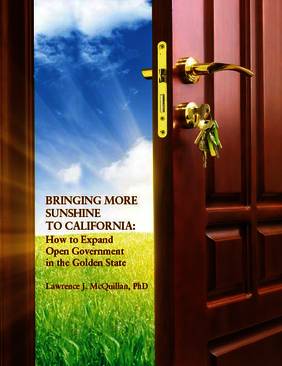Study looks at the history, strengths, and weaknesses of open-government laws and practices in California and recommends more than two dozen reforms based on a comparative assessment of California’s laws and practices with those in the other 49 states.
Sacramento—California’s open-government laws are weak in many areas and in need of updating, according to a new report from the Pacific Research Institute (PRI), a California-based free market think tank. Bringing More Sunshine to California: How to Expand Open Government in the Golden State looks at the history, strengths, and weaknesses of open-government laws and practices in California. The study, by Lawrence J. McQuillan, Ph.D., PRI’s director of Business and Economic Studies, also recommends more than two dozen reforms based on a comparative assessment of California’s laws and practices with those in the other 49 states.
“This week is Sunshine Week, a national initiative to promote the importance of open government and freedom of information, and an ideal time to illuminate California’s unfortunate trend toward relatively more closed government operations,” said Dr. McQuillan. “The state that once was a national leader in open government now receives a letter grade of ‘F’ for its open-records law from the National Freedom of Information Coalition and the Better Government Association.”
“Recent incidents like the City of Bell pay scandal show that California’s open-records and open-meetings laws are in need of reform,” added Dr. McQuillan. “Public pay is the public’s business, along with the debates, decisions, and actions of government and the outcomes of government policies.”
To determine the problems with California’s current transparency rules, Bringing More Sunshine to California compares the state’s open-government laws to those in the other 49 states using two recent scholarly assessments. By identifying the primary limitations and loopholes in the current system, the report provides a basis for open-meetings and open-records policy recommendations.
A complete list of the 26 recommendations is available here.
“If the policy recommendations in this report were adopted in California, the state would be the national leader in open government and would uphold the fundamental right of public access included in the California Constitution,” concluded Dr. McQuillan. “There are powerful incentives facing elected and appointed public officials and government employees to conceal information and operations for their own benefit, which is why sunshine laws must be strengthened to make government open and accountable.”
For more information contact PRI’s Press Office at 415/955-6136 or [email protected].

